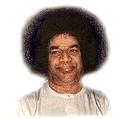Pradoshe
Deepakaschandrah
Prabhaate Deepako Ravihi
Trailoke Deepako Dharmah
Suputrah Kula Deepakah
The moon is the source of light at night.
During the day, the sun gives light.
Dharma illumines the three worlds.
A good son is the light of the family.
 There
are two kinds of night: full moon and new moon. Darkness
is not generally desired. But there are some people, like
thieves and wicked people, who revel in it. Darkness
aides bad thoughts and facilitates sinful behavior. Hence
it is called Râkshasa Kâlam - demonic
period of time.
Night is characterized by tamo guna (mode of
ignorance). Therefore, peaceful and virtuous people do
not desire darkness.
There
are two kinds of night: full moon and new moon. Darkness
is not generally desired. But there are some people, like
thieves and wicked people, who revel in it. Darkness
aides bad thoughts and facilitates sinful behavior. Hence
it is called Râkshasa Kâlam - demonic
period of time.
Night is characterized by tamo guna (mode of
ignorance). Therefore, peaceful and virtuous people do
not desire darkness.
-
Pradoshe Deepakaschandra -
The fulI moon is bright
and beautiful. Everyone awaits the full moon. Poets are
inspired to compose poems looking at it and children play
joyously in its cool light. The moon is called
chandamama - Uncle Moon. He is an uncle to
children, to parents, to grandparents... to everyone. He
is the same to everyone. Therefore, light has a lot of
significance. It aids sacred thoughts.
-
Prabhaate Deepako Ravihi -
The Sun and the Moon
sustain the world. Without the sun there cannot be life.
The sun gives us light, seasons, rain and food. Many
diseases are cured by the sun's benevolent rays. Even
electricity can be generated from sunlight.
-
Trailoke Deepako Dharmah -
The third
is dharma: Dharma means "that which binds". Dharma binds
us within limits, helping us tread the right path and
discharge our duty. Dharma establishes norms of
behavior between two persons, between a person and
society and so on. It helps human values flourish. When
dharma declines, human values suffer and this, in turn,
spells the ruin of life. A country without dharma is a
country of demons. Dharmo Rakshati Rakshitah -
Dharma protects those who protect it. Therefore,
adherence to truth and dharma are most important for
students today. The Vedas say - Satyam Vada, Dharmam
Chara - Speak the truth and follow
righteousness. These are the great legacy from our
ancient heritage. The true treasures of Bharatiyas
are only sathya and dharma.
-
Suputrah Kula Deepakah -
Now, the
fourth. A virtuous child brightens the whole family. Even
a single virtuous person brings a good name to the
family. One jasmine creeper lends an enchanting smell to
the entire forest. If every house had even a single
virtuous member, the world will glow with effulgence. Any
number of children without virtue are useless. The
Mahâbhârata also teaches this truth.
Dhritarashthra had a hundred sons but they did not
benefit him or his kingdom. Sage S'uka had no children
and yet, he was ever blissful! Therefore, it is foolish
to rejoice at the birth of a son. The father doesn't feel
happy merely at the birth of a son. Parents experience
joy only when children demonstrate piety and earn
unsullied reputations. Among today's students we need
suputras - good sons. Who is a "good son"? Is he
one with a good nose, good eyes and a good body? No. Only
one with pure qualities is a good son. No matter how
handsome a boy may be, without virtue he is only
ugly.
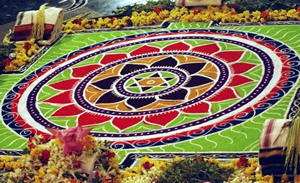
The
Story of Nâbhâga
The
Bhâgavatam contains the narrative of an
emperor called Nabhaga. He had many sons, one of
whom was Nâbhâga.
Nâbhâga was a great scholar. He
entered a gurukula,
to learn different kinds of knowledge. He was an ideal
student. He dedicated his time
and his body to the acquisition of education. To this end
he even forgot his parents! He considered education to be
the jewel of life. He realized the tremendous power of
true knowledge and decided to spend his life acquiring
it.
Nâbhâga
came to spend most of his time
in the gurukula. In due course his father,
Nabhaga, grew old and resolved to divide his wealth among
his sons. He gave wealth to all his sons but forgot
Nâbhâga because Nâbhâga was away
in the pursuit of education. After completing his
studies, Nâbhâga returned home. He saw his
brothers ruling the kingdom. He asked them, "Brothers,
where is my share of the inheritance?" They replied,
"Father did not leave you a share. But we are yet to
decide what to do with father himself. Hence, you can
have father as your share."
Nâbhâga
was highly educated. He recognized the respect due to
a father and said, "Father is enough for me." As per the
sacred culture of India - Maatru Devo Bhava, Pitru Devo
Bhava - Mother and father are equal to God.
S'rî Râma offered his entire life to
uphold his father's word. Similarly, Nâbhâga
said, "My father is my true wealth" and went to his
father. He told Nabhaga, "Dear father, as my brothers
have told me, you are my real wealth."
His
father replied, "Dear son, I have no property. But I will
teach you a way to earn wealth. Sage Angirâ
is performing a yajña. No one else in the
world is competent to perform this yajña.
Two mantras are required for successful completion
of this yajña. Ritviks
have been conducting this yajña for a long
time
because they do not know how to complete it. These two
mantras are your real wealth. I will teach them to you.
Go there and recite them."
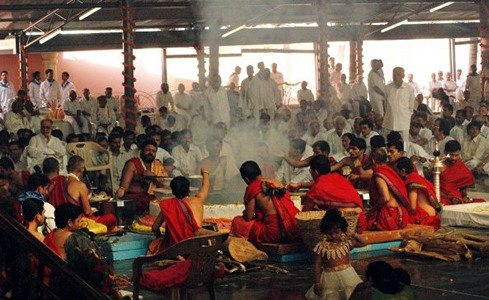
Ever obedient,
Nâbhâga went to the yajña. He
approached sage Angirâ and said, "I can recite the
mantras that will complete your yajña." He
did so and the yajña was completed successfully.
Angirâ acknowledged Nâbhâga's
contribution and said, "Dear child, I'm leaving for
Vaikunthha
now. Enjoy all the wealth collected for this
ceremony."
After everyone departed,
Nâbhâga began gathering the wealth. A dark
man approached and claimed authority over it. He said,
"I'm Rudra.
It is the divine command that wealth left-over from all
yajñas belongs to me," Nâbhâga
said respectfully, "You have your right and I have mine,
Let us find a third person to resolve our dispute."
.
They went to Nabhaga, who
was a master of all scriptures. Nabhaga pondered the
matter and judged not in favour of his son, but in
Rudra's favour. Nâbhâga fell at Rudra's feet
and sought pardon for his mistaken claim. Rudra admired
Nâbhâga's sense of justice, truthfulness and
devotion to his father. Bestowing all the wealth on
Nâbhâga, Rudra said, "Son, the whole world is
illumined by your virtues. I'm pleased with your ideal
qualities. I have never met a student like you." Rudra
blessed him that he would rule the kingdom for a long
time
and also gave him the most permanent wealth - Atma
Vidya. Nâbhâga was filled with bliss. He
went on to become the richest among kings of the
Ikshvâku
dynasty.
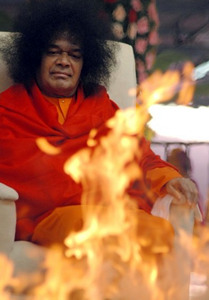
The
Story of Ambarîsha
In due course,
Nâbhâga had a son called
Ambarîsha. The story of Ambarîsha in
the Bhâgavatam is very sacred.
Ambarîsha was highly educated. He showered
happiness on his subjects, considering them his children.
To him, his subjects were parts of his body and the Lord
was his heart. A king and his subjects are related to
each other as the head is to the body, he
believed.
Worldly experiences are
dreams. Nothing is permanent. Anityam Asukham Lokam -
The world is temporary and sorrowful.
Maata Naasti,
Pita Naasti, Naasti Bandhu Sahodarah
Artham Naasti, Griham Naasti, Tasmaat Jaagrata
Jaagrata
Mother, father, brother, relatives,
Wealth, home - all are unreal. Therefore, beware,
beware!
All relations are to do
with the body. They are based on attachment, not on love.
Attachment is bondage. Knowing this all too well, we
still desire them and descend into bondage.
Ambarîsha realized this very early in life. He
decided that he wanted only the treasure of God's
proximity and not worldly attachment.
Sages Vasishthha
and Gautama once instructed King Ambarîsha
to perform the As'vamedha-yajña.
Many kings had performed the same yajña
successfully but no one in any age had done it like
Ambarîsha. He conducted it magnificently, giving
away cows, land, gold and other articles in charity,
articles which people had never seen or heard of before.
During the yajña Ambarîsha forgot his
kingdom and even his body. He concentrated only on Lord
Nârâyana. At the end of the
yajña, Lord Nârâyana appeared and
presented His personal weapon, Sudars'ana
Cakra, to
Ambarîsha.
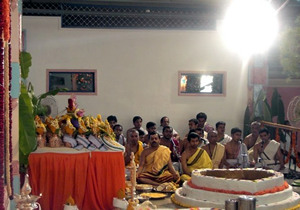
What is meant by
Sudars'ana? In a worldly sense, it means a disc
endowed with power. Spiritually, Sudars'ana means
"good sight" The ability to see everything in its true
light. Armed with this blessing of Sudars'ana,
Ambarîsha was able to enjoy the world and surmount
all difficulties in his life. He had no worries, sorrow
or desires. He concentrated whole-heartedly on the
Lord.
Some time
later, instructed by sage Vasishthha,
Ambarîsha performed the dvâdas'î
vrata (vow of fasting on certain lunar days for a
whole year). After observing certain disciplines for 12
months, Ambarîsha was to fast on the day prior to
the completion of the one year period. The fast was to be
broken at a particular time
the next day, just before the end of the year. And after
partaking food himself, he was to feed his subjects as
well. These were the stipulations of the vow.
Ambarîsha was
getting ready to break his fast on the last day. Sage
Durvâsâ arrived unexpectedly. Ambarîsha
honored him. Durvâsâ said, "O king, no one
has performed such a vow in the world. You will achieve
great fame. Your kingdom will always experience peace and
abundance." Ambarîsha pleaded, "Swami, you must
accept my hospitality today". Durvâsâ said,
"With pleasure, but give me some time.
I will go to the river, bathe and complete my daily
prayers." So saying, Durvâsâ left for the
river with his entourage.
Ambarîsha started
getting worried when Durvâsâ did not return
even after a long time.
Why? On the one hand, the etiquette of a host demanded
that he could not eat before offering food to his guest.
On the other hand, rules of the dvâdas'î
vrata dictated that Ambarîsha had to eat before
the auspicious moment of the completion of one year,
which had arrived. Ambarîsha was as worried now, as
he was peaceful during the vow. Vasishthha
suggested that he touch a few drops of tulasî water
(basil plant, sacred to Hindus) to his lips to break his
fast, assuring him that no fault would accrue to him by
this act. Ambarîsha obeyed Vasishthha.
Durvâsâ
returned after the auspicious moment. He divined
Ambarîsha's action. He said, "Ambarîsha, you
are blind with pride!" Ambarîsha asked, "Honorable
sage, what is my fault?" Durvâsâ said, "How
dare you act innocent! You invite me as a guest and then
eat before you serve me! Is this not a violation of the
principles of hospitality? I am a Mahârishi,
(great sage) not an ordinary guest! To insult me is not
expected of you!" Ambarîsha claimed innocence,
humbly but fearlessly. But Durvâsâ was
adamant. He plucked one hair from his head and empowered
it with a mantra. A terrible demoness appeared and
lifted her sword to kill Ambarîsha. In a flash, the
Sudars'ana Cakra appeared and put an end to the demoness.
The Lord's weapon then turned on sage
Durvâsâ.
Durvâsâ fled.
Sudars'ana Cakra followed him through forests, rivers,
deserts, plains, cities... everywhere.
Durvâsâ ran and ran. Finally, he sought
refuge in Brahmaloka, Lord Brahmâ's
abode. Brahmâ told him: "I'm helpless. I cannot
challenge Lord Nârâyana's power. I am the
Lord's servant. You will gain nothing from
me."
Durvâsâ then
fled to Kailasa, Lord S'iva's home. Lord S'ankara
spoke similar words, "I have no right to oppose
Nârâyana's will. I cannot help you."
Durvâsâ then ran to Lord Nârâyana
Himself. The Lord said: "O sage! Do you not see My
helplessness? I may be allpowerful, but I cannot break
one bond: The bond with devotees who have renounced
everything for Me. I will always submit to My devotees.
Ambarîsha is one such devotee. He has renounced
everything and he seeks Me alone. I cannot deny such
surrender. The power of love (prema s'akti) of My
devotees is greater than My own will power (iccha
s'akti)! I cannot help you in the least. But I will
suggest a solution. Seek the pardon of
Ambarîsha."
As advised by Lord
Vishnu, Durvâsâ retraced his steps and
fell at Ambarîsha's feet. Durvâsâ's
penance and powers were unsurpassed. Imagine, such a
great sage falling at a king's feet! Ambarîsha was
surprised and embarrassed. He said, "O great sage! You
are rich in penance and wisdom. Please do not fall at the
feet of an ordinary man like me." Durvâsâ
replied, "In my pride I spoke harsh words to you. I made
you suffer without recognizing your sincere devotion.
Pardon me." Ambarîsha then prayed on
Durvâsâ's behalf, "O Lord Vishnu, You are the
embodiment of love and compassion, You are allknowing and
omnipotent. Please forgive the sage's faults." Only then
Sudars'ana Cakra stopped pursuing the sage.
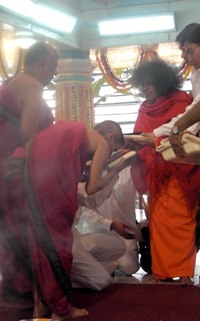
\~*~*~*~*~*~*~*~*~*~*~/
-
The Lord is a Servant -
What is
the inner significance of this story? The Lord is a
servant of His devotees. He is the final authority
everywhere, except in the presence of His devotee! The
Lord's powers are benign to His devotees and devastating
to wicked people. Hanumân's life signified
the same idea. Hanumân was humble in front of
Râma but bold and terrible to
Râvana. Virtue, faultless behavior,
renunciation - all these are merely facets of
devotion.
Ambarîsha
was an emperor not just of his kingdom, but in the
kingdom of devotion as well. Even Brahmâ, Vishnu
and S'iva had to bow to his devotion! The efficacy of
devotion is - Avaang Maanasa Gocharam - beyond thought
and word. In this Kali age, people do not
understand devotion. They think devotion is limited to
worship, bhajans and vows. God's form should be
imprinted in your heart like words on paper! There should
be no separation, no distinction between you and God.
Such intense faith is rare today. Ambarîsha's eyes
only saw Nârâyana, his ears heard only the
Lord's Name, his feet approached only the Lord and his
hands were ever engaged in worship. Divine brilliance
flowed through all his senses.
Nabhaga,
Nâbhâga and Ambarîsha - grandfather,
father and son - all three were highly educated. What
education did they have? Not worldly education, but
Atma Vidya! (knowlegde of the Self).
Krishna said - Adhyâtma Vidyâ
Vidyânâm - True knowledge is knowledge of the
Self (B.G.10-32).
The different kinds of worldly knowledge are small
trickles which merge into the ocean of Atma
Vidyâ. Nadeenâm Sâgaro Gatih -
All rivers are destined for the ocean. It is only
because he pursued spiritual knowledge hand-in-hand with
worldly knowledge that Ambarîsha became worthy of
the Lord's protection. He was able to subdue the curse of
a sage. A curse given by a sage is normally irrevocable.
But Ambarîsha was able to humble even a sage of
Durvâsâ's stature!
Nothing
in the world comes close to the power of devotion. But
fools are blind to it. Truly, one who recognizes the
potency of devotion cannot stay aloof from the path even
for a moment. Even nectar may have traces of bitterness
but the principle of devotion is sweetness, sweetness,
sweetness. Prema-amritam - the nectar of devotion
- is the limit of sweetness. Such
prema-amritam is present only between God and
devotees. All other relations are based on attachment.
Love and attachment are poles apart.' People tell Swami,
"I love you, I love you, I love you". What is love? They
don't know.
-
Service -
Chatterji just spoke
about "help". Students have no idea even what "help"
means. They just repeat phrases like "Help Ever, Hurt
Never." Help means to render assistance. But what kind of
help, where, to whom and how? We must understand this
well.
That is why the Bhâgavatam says: Charity
must be based on eligibility; do not help anyone,
anytime, anywhere.
Before acting you must assess: "To whom am I rendering
help and how? What would be the result of my action?"
You can't give a knife to a wicked man, or a gold cup to
a child. There must be deservedness in help. Otherwise,
help can turn into harm. When should you help? When
you watch someone suffering, feel it in your heart. Feel
their pain and serve when your heart melts. Meaning,
offer help to that cause which melts your heart. When
many people can be benefited, you may definitely help.
Help is not just to individuals. It should be related to
society and even to the world [see
S.B.
several chapters on the subject].
This morning Ashok
Singhal talked about the importance of service. What is
service? People say it means doing "good work". Do not
think of seva as "good work". Even the attitude "I
am doing good to others" is not positive. The right
attitude is to see it as "God work"! True seva
is to consider all your actions as God's
work.
Na Tapaamsi Na
Teerthaanaam
Na Saastra Na Japaanahi
Samsaara Saagaroddhaare
Sajjanam Sevanam Vina
Not by penance or
pilgrimage,
Nor by study of scriptures or repetition of God's
name.
But the ocean of birth and death can be crossed only
by
serving the pious and the needy.
Help pious and needy
people alone. If a man is beating another man, will you
help him in that act? Always discriminate before jumping
to help. Someone asks you for money. You must ask him why
he wants money. If he says he is hungry, give him food,
not money. His real need is food. If he insists on money,
such a person should not be helped. If he is cold, give
warm clothes. If he is ill, give medicine. But don't give
money. Why? He will spend it on liquor, go home and drown
himself and his family in misery. By giving money you
have not helped him, but hurt him! So, always enquire
whom you should help, when, where and how. This is true
seva.
People think, "I am the
giver, he is the recipient". This is not seva.
Once upon a time a man resolved to perform seva.
He told himself, "I am a servant. That is why I serve."
The divinity present in servitude is not present in
authority. He prayed:
Daasaanudaasudanu
Kaavalenu Ra,
Daasulaku Sevane Cheyavale Ra.
0 Lord! Let me be the
servant of Your servants.
Let me be busy serving Your servants.
What is the meaning? The
goal of service is to subdue egoism. The egoist can never
serve and the real servant is egoless. Proceed into
service with such an outlook. There is nothing greater
than service. We should develop humility. Authority and
power do not stay forever. Wealth can vanish any moment.
But virtues are permanent.
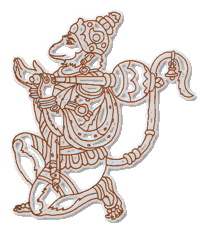 When
Hanumân entered Lankâ all the demons were
intrigued by his appearance. They had never seen a monkey
before. Why? Recall that Lankâ was surrounded by
the sea on all sides, and what monkey can cross the
ocean? While they gaped at Hanumân with surprise,
he laughed and played impish pranks. Then a demon
questioned, "Hey, who are you?" The answer came:
"Daasoham Kosalendrasya" - "You ask who I
am? I am the servant of Râma."
Hanumân did not say, "I am the virtuous, strong and
devoted son of the Wind God" and so on. It is because of
his humility that Hanumân always succeeded in the
tasks allotted to him by Râma. To fulfill God's
commands, first we must render our ego powerless. We
should express humility. Not merely express it, but
practise it.
When
Hanumân entered Lankâ all the demons were
intrigued by his appearance. They had never seen a monkey
before. Why? Recall that Lankâ was surrounded by
the sea on all sides, and what monkey can cross the
ocean? While they gaped at Hanumân with surprise,
he laughed and played impish pranks. Then a demon
questioned, "Hey, who are you?" The answer came:
"Daasoham Kosalendrasya" - "You ask who I
am? I am the servant of Râma."
Hanumân did not say, "I am the virtuous, strong and
devoted son of the Wind God" and so on. It is because of
his humility that Hanumân always succeeded in the
tasks allotted to him by Râma. To fulfill God's
commands, first we must render our ego powerless. We
should express humility. Not merely express it, but
practise it.
People think, "I am so
educated, so intelligent, so influential." How long do
authority and power last? With retirement, your influence
vanishes like snow on a summer day! The world has seen
kings and rulers, each greater than the other. Many
emperors ruled over India. Where are they today? Wealth
and authority are transient, but virtues are lasting. It
has been eons since Ambarîsha died. But the glories
of his character are sung the world-over till this day.
Therefore, we become worthy of immortal fame when we
shine in virtue. Worldly joys are "passing clouds".
Ambarîsha recognized this truth. Nothing in this
world grants happiness or peace. Happiness and peace are
unique to God's proximity alone. The king of Tanjavur
wanted to present wealth to Tyagaraja. Tyagaraja
sang:
Nidhi chaala
sukhamaa, Îs'vara sannidhi chaala sukhama? Nijamuga
Telupumu Manasa!
0 mind, what grants happiness - wealth (nidhi)
or proximity to God (Îs'vara
sannidhi)?
As long as worldly joys
are around, you may experience them. It is not possible
to renounce them entirely. But for God we should be ready
to give up everything! "Less lugguage, more
comfort" Reduce responsibilities and desires
gradually. Desires are the greatest thieves and
cheats. Desires are the root cause of restlessness.
Sacrifice is the basis for peace. Every man must
encourage pure feelings and sacrifice in his heart if he
desires divinity. Even if you have no devotion, that is
okay. Your pure feelings are your devotion.
There are many meanings
given to the word "help". We should not use this word
carelessly. True help should include the society and
permeate your thoughts, words, sight, hearing and hands.
Help rendered with unity of thought, word and deed
(trikarana suddhi) is true service. Help means
love and compassion guiding your hands.
 There
was an old woman full of sacrifice and kindness. During
the rainy season, cool breeze made nights very cold. In
the evenings she would go along the streets with a bundle
of blankets. Many homeless people slept on the footpath.
She would cover each of them with a blanket. Gradually
the townsfolk came to know of this daily ritual. "What
humility and sacrifice she has! Is there anyone in the
world doing more service than her?", they thought. When
everybody praised her in this manner, she used to veil
her head and walk away. One boy asked her, "Grandma! Why
don't you hold your head high for this wonderful seva?"
She said, "Son, I'm not helping anyone." The boy said,
"But aren't you donating blankets to the shivering street
people every day?" She said, "Son, God has given us two
hands. Compared to what He does, all our work is trivial.
And I'm using only one hand to distribute the blankets. I
feel ashamed for not using the other hand. I can hold my
head high only when God blesses me with opportunities to
serve with both my hands."
There
was an old woman full of sacrifice and kindness. During
the rainy season, cool breeze made nights very cold. In
the evenings she would go along the streets with a bundle
of blankets. Many homeless people slept on the footpath.
She would cover each of them with a blanket. Gradually
the townsfolk came to know of this daily ritual. "What
humility and sacrifice she has! Is there anyone in the
world doing more service than her?", they thought. When
everybody praised her in this manner, she used to veil
her head and walk away. One boy asked her, "Grandma! Why
don't you hold your head high for this wonderful seva?"
She said, "Son, I'm not helping anyone." The boy said,
"But aren't you donating blankets to the shivering street
people every day?" She said, "Son, God has given us two
hands. Compared to what He does, all our work is trivial.
And I'm using only one hand to distribute the blankets. I
feel ashamed for not using the other hand. I can hold my
head high only when God blesses me with opportunities to
serve with both my hands."
There are many fools in
the world who do not sacrifice despite being rich. They
go to the market with loose change in their pockets, not
currency notes. They give a few coins to each beggar they
encounter. Another example. I went to Bombay a few days
ago. From Bombay, we had to drive to a nearby town. On
the way we stopped at a red light. Many beggars
surrounded the car. I noticed one woman carrying a baby
and felt very pained. But I do not even have a pocket,
what to talk of money! I told Indulal Shah, "You give her
something." He gave one rupee from his pocket. Do you
know what that lady did? She tossed it back into the car
saying, "You cannot get anything with one rupee today,
Sir. You can keep it!"
Even five rupees are not
much to beggars today. In such a situation, will a few
coins do any good? Some people are so stingy that even
the coins they donate are counterfeit! No, no. Where did
you get all your money? We see big industrialists, rich
beyond the common man's imagination. How did they get
rich? The money was earned with the assistance of the
middle class, the labourers, the officers. When you know
that everyone is responsible for your prosperity, you
must sacrifice for their sake. In Kali Yuga,
riches only increases pride instead of evoking sacrifice
in people. Na Karmana Na Prajaya Dhanena Tyaagenaike
Amritatvamaanashu - Not by rituals, children or
wealth, but only by sacrifice is immortality attained.
Keep what you need and share the rest.
Hastasya
Bhooshanam Daanam
Satyam Kanttasya Bhooshanam
Charity is the ornament
for the hand.
Truth is the ornament for the throat.
What ornaments do you
desire? Gold? Diamonds? No, no. What other decorations do
we need besides charity, truth and the Lord's name? This
is true sacrifice.
-
Desire God Alone -
Therefore, all of you
should promote unity based on the
âtmâ, contemplate on divinity and do
actions beneficial to the common good. How can you call
yourself a human without following human values?
Today's dire need are human values, human
values.
How can we make human
values grow? A seed grows into a plant when embedded in
fertile soil. Will it germinate in a tin? No. Similarly,
the seed of human values can grow only in the soil of
spirituality. Without this fertile and enduring soil of
spirituality, humanness cannot be strengthened. The heart
filled with love for God is like nutritious soil. Sow
your seed in such a heart.
Look at Ambarîsha.
Despite his vast knowledge, wealth and powers, he
renounced worldly joys: "I want only God, nothing else.
He alone is my goal". Keep God as your goal. Today's
students change their ambitions a hundred times a day!
No, no. Till your last breath your goal should not
change. Even if you encounter a hundred troubles, face
and overcome them. Do not let them deter you. That is the
quality of a true human. Look how Ambarîsha
suffered. Durvâsâ's curse caused him much
hardship. But his one-pointed mind and steady vision bore
him through everything.
A one-pointed mind and
steady vision: These two are the touch-stones of devotion
which every devotee must acquire. Our vision must focus
only on the Lord. Our mind must meditate only on God. The
sole motivation for all our actions must be to earn God's
Love (bhagavat preetyartham) .
-
Seek Knowledge in Student Years -
Students! Fill your
hearts with such pure feelings. Yes, you are filling
yourselves. But with what? With absurd novels, TV, radio
and videos. It is not even enough to fill your hearts.
Translate into action! That is the mark of a true
student. Seekers of knowledge (vidyarthis) should
not turn into seekers of worldly joy
(vishayarthis).
Desire only knowledge as
long as you are a student. After completing education,
you may desire money. Ambarîsha did not care for
anything as long as he pursued knowledge. He entered the
kingdon only after completing his education. That is how
he was able to serve his subjects. He initiated projects
of public welfare, won his people's love and even
attained the Vision of God.
-
All Work is God Work -
Ambarîsha achieved
divinity, the grace of God. Students! You may not win or
be eligible for anything, but earn divine grace. That is
enough. Earn God's grace first and you can achieve
whatever you wish. Tyagaraja sang, "Râma,
all I need is your grace (anugraha). Then the nine
celestial powers (nava grahas) will submit to me."
[see for example S.B.
7:5-23-24].
You may study great subjects, get coveted jobs and earn
wealth, but nothing is of value unless you earn Gods'
Grace.
A student in Varanasi had
no job. He approached the municipality. They told him,
"Son! Jobs are scarce today. But there is nobody to light
the oil lamps on the streets. You can do that if you
wish." The poor boy said, "I am ready for any job, Sir".
So he would clean each lamp at dusk, fill it with oil and
light it. He did everything as an act of service. As he
cleaned each glass frame he thought, "Râma, this is
my service to You." He visualized that he was cleaning
Râma's Feet with each rub. As a result, his lamps
were immaculate and glowed brighter than all others. The
municipal officers recognized this and summoned him,
"Son! Your lights are burning as brightly as your pure,
sacred heart." The boy didn't care for recognition. He
did it out of his enthusiasm, for his own
satisfaction.
Today's service is pomp.
They take a broom in their hands and call the
photographer, "Hey, take a photo of me doing service!"
This is for others, not for yourself, not for the
âtmâ. That which gives you unalloyed
happiness and increases your enthusiasm is true service.
Service makes you forget yourself.
Students! The
Bhâgavatam has many examples of devotees
with full hearts. Recognize their characters, hold them
as ideals in your mind and emulate them. This is the
Kali Yuga. A more suitable name is Kalaha
Yuga, Era of quarrels! There are fights even for
small matters. In the midst of conflict, develop hearts
of purity and serve your country. Recognize that you are
serving only yourself, not anyone else. The same God is
in everyone. Your ego wIll recede as your attitude of
service strengthens. When you engage in service with such
divine feelings, our country will shine brightly with
purity and prosperity.
Bhagawân
concluded with the Bhajan "Prema Mudita Manase Kaho,
Râma Râma Ram"
'Recite the name of Lord Râma with your heart and
mind full of love and devotion' - Lyrics



Time:
The
solar Order; /
The
Lunar Order, /
The
Galactic Order, /
The
Full Calendar of Order,
/ Calculation
help for setting a clock to the
sun. [see
also S.B.
3:11.]
Gurukula:
ancient Indian hermitage-school, where students of
all backgrounds lived as equals with a guru and
acquired secular and spiritual education.
Ritvik: a ritvij or priest;
there are four of them: 1. the hotâ priest (the one
offering oblations and singing the Rig Veda verses), 2.
the brahma priest (supervising the proceedings), 3. the
adhvaryu priest (who chant the yayur-mantras and prepares
the sacrifice by arranging the sacrificial ground, the
altar, etc.) and 4. the udgâtâ priest
(singing the Sâma-veda hymns) (see S.B.
9.11:
2).
As'vamedha-yajña:
Horse-sacrifice. At the end of the life or the rule
of a king is a horse sent out with a plaquette around its
neck followed by an army. Anyone contesting the honor
inscribed on that plaquette is then fought. Method to
take leave of wordly attachments and status (see
S.B.
9:8). In a
spiritual sense, Swami says, the body of a horse
constantly twitches - symbolic for the restlessness of
the mind. This rite is to attain steadiness of mind. (see
also B.G.
6:33-35)
Sudars'ana Cakra: ('His
tangible presence with the cyclic, the order of
time')
Lord Vishnu's weapon in the form of a disc, referring to
the vital power of tejas.
Cakra: ('wheel, wheel or order
of time,
cyclic time,
circle, totality') term in bhakti used for the totality
of the celestial sky, or the disc of stars that is our
Milky Way, that as a wheel or disc apparently revolves
around the polar star but in fact revolves about the
center of the galaxy (S'is'umâra, see
S.B.
5: 23).
- The cyclic, the cyclic of time to the sun and moon and
stars, that together with linear time (clock-time, the
week-order) and psychological time; the past, the present
and the future makes up the basic tri-kâlika, or
threefold of time.
- Also disc of Krishna or Sudars'ana, the acute of His
presence or supreme vision of Him; time as the weapon of
Vishnu. A breach with the order of time or the cakra is a
fall-down, a betrayal of niyama, or regulation.
Consequence: a punishment of the fire of unbounded energy
released from the cakra-order, the broken order is the
lust that leads to anger and ultimately madness: the head
is cut off by the cakra when one remains in offense with
Krishna.
Tejas: splendour, brilliance,
light, clearness of the eyes , the vital power, spiritual
or moral or magical power or influence, majesty, dignity,
glory, authority, the fire in opposition, ardour, spirit,
efficacy, essence; semen virile and the marrow; the brain
but also: impatience, fierceness, energetic opposition.
Said to be represented in the Krishna's Sudars'ana cakra
(see S.B. 12.11:
14-15).
Vaikunthha (-loka):
literally the place where there is no laziness,
indolence, stupidity, foolishness or - rethorically -
fear. The heavenly abode of Lord Nârâyana.
The ideal planet, the spiritual world. There are many
vaikunthhaloka's: depending on the form of the Lord
worshiped there.
- The spiritual kingdom, where everything is
sat-cit-ânanda, eternal, full of wisdom and bliss
(see also S.B.
3:15).
Rudra: 'the gruesome' ;A form of
Lord S'iva 'the auspicious'. Also known as S'ankara
(causing prosperity), Bhava (of existence), S'ambhu (as
the beneficent), Mrida (the compassionate), Giris'a (the
lord of the mountain), S'arva (he who kills with arrows)
and Mahâdeva (the great god).
Ikshvâku: a son of
Manu, who in the past received the knowledge of the
Bhagavad Gîtâ. Also known under the name of
his dynasty, in which Lord Râma appeared.
Bhâgavatam: see for
example: 6:2-17,
7:7-51-52,
11:17-18
etc.,
11:19,
11:23,
11:12,
12:13-18.
![]()
![]()
![]()
![]()
![]()
